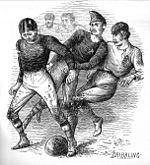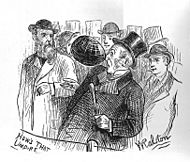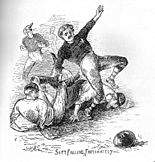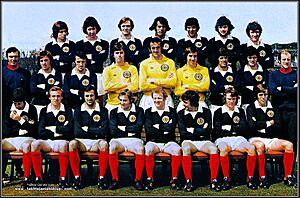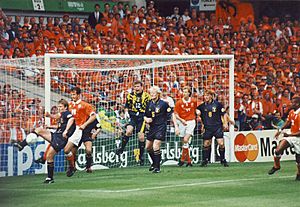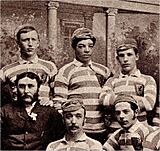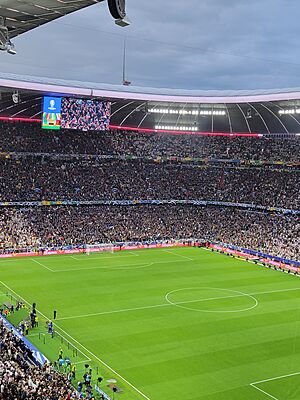Scotland national football team facts for kids
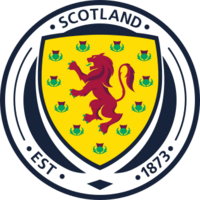 |
|||
| Nickname(s) | The Tartan Army (supporters) | ||
|---|---|---|---|
| Association | Scottish Football Association | ||
| Confederation | UEFA (Europe) | ||
| Head coach | Steve Clarke | ||
| Captain | Andy Robertson | ||
| Most caps | Kenny Dalglish (102) | ||
| Top scorer | Kenny Dalglish Denis Law (30) |
||
| Home stadium | Hampden Park | ||
| FIFA code | SCO | ||
|
|||
| FIFA ranking | |||
| Current | 40 |
||
| Highest | 13 (October 2007) | ||
| Lowest | 88 (March 2005) | ||
| Elo ranking | |||
| Current | 40 |
||
| Highest | 1 (1876–92, 1904) | ||
| Lowest | 64 (May 2005) | ||
| First international | |||
(Partick, Scotland; 30 November 1872) (The first ever international football match) |
|||
| Biggest win | |||
(Glasgow, Scotland; 23 February 1901) |
|||
| Biggest defeat | |||
(Basel, Switzerland; 19 June 1954) |
|||
| World Cup | |||
| Appearances | 8 (first in 1954) | ||
| Best result | Group stage (1954, 1958, 1974, 1978, 1982, 1986, 1990, 1998) | ||
| European Championship | |||
| Appearances | 4 (first in 1992) | ||
| Best result | Group stage (1992, 1996, 2020, 2024) | ||
| Website | scottishfa.co.uk | ||
The Scotland national football team plays for Scotland in international football games. It's managed by the Scottish Football Association. They play in big tournaments like the FIFA World Cup, UEFA Nations League, and the UEFA European Championship. Scotland is part of the United Kingdom, so its athletes compete for Great Britain in the Olympic Games. This means the Scottish football team doesn't play in the Olympics. Most of Scotland's home matches are played at Hampden Park, their national stadium.
Scotland and England are the oldest national football teams in the world. They played the first international football match in 1872. Scotland has a long-standing rivalry with England. They used to play every year from 1872 until 1989. Since then, they have only met nine times, with their most recent game being a friendly match in September 2023.
Scotland has made it to the FIFA World Cup eight times and the UEFA European Championship four times. However, they have never gone past the first group stage in any of these tournaments. The team has had some amazing moments, like beating the 1966 FIFA World Cup winners England 3–2 at Wembley Stadium in 1967. Archie Gemmill scored a goal in the 1978 World Cup against the Netherlands that many call one of the greatest World Cup goals ever. Scotland won that game 3–2. Also, in their qualifying group for UEFA Euro 2008, Scotland beat 2006 World Cup runners-up France 1–0 in both games.
Scotland's supporters are known as the Tartan Army. The Scottish Football Association keeps a special list, called the Scottish FA International Roll of Honour, for players who have played more than 50 games for Scotland. Kenny Dalglish has played the most games for Scotland, with 102 appearances between 1971 and 1986. Dalglish also scored 30 goals for Scotland, sharing the record for most goals with Denis Law.
Contents
History of Scottish Football
Early Days of Football
Scotland and England have the oldest national football teams in the world. They played the first official international football match on November 30, 1872, in Partick, Scotland. The game ended in a 0–0 draw. All eleven players for Scotland that day were from the amateur club Queen's Park in Glasgow. For the next 40 years, Scotland only played against the other three Home Nations (England, Wales, and Ireland). The British Home Championship started in 1883, making these games competitive. The matches against England quickly became a fierce rivalry.
Scotland had a great start, losing only two of their first 43 international matches. They didn't lose to a team other than England until 1903, when Ireland beat them 2–0 at home. This success meant Scotland would have often been ranked number one in the World Football Elo Ratings between 1876 and 1904. Scotland won the British Home Championship 24 times on their own and shared the title 17 times. A famous win before World War II was their 5–1 victory over England in 1928. This team became known as the "Wembley Wizards".
Scotland played their first match outside the British Isles in 1929, beating Norway 7–3 in Bergen. They continued to play friendly matches against European teams, winning against Germany and France. However, they lost to the Austrian "Wunderteam" and Italy in 1931.
Like the other Home Nations, Scotland did not enter the three FIFA World Cups in the 1930s. This was because they had a disagreement with FIFA about amateur players. All four associations, including Scotland, rejoined FIFA after World War II. A special match between a United Kingdom team and a "Rest of the World" team was played at Hampden Park in 1947 to celebrate this.
Joining the World Cup in the 1950s
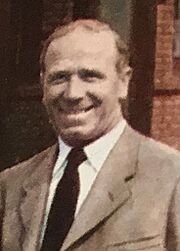
When the Scottish Football Association rejoined FIFA, Scotland could enter the 1950 FIFA World Cup. FIFA said the top two teams in the 1949–50 British Home Championship would get spots. But the SFA announced Scotland would only go if they won the championship. Scotland won their first two games, but a 1–0 loss to England meant they finished second. Even though they had qualified, the SFA stuck to their rule, and Scotland did not go to the World Cup. Instead, the team went on a tour of North America.
The same rules applied for the 1954 FIFA World Cup, and Scotland again finished second in the 1953–54 British Home Championship. This time, the SFA allowed the team to go, but their preparation was very poor. The SFA only sent 13 players, even though FIFA allowed 22. Scotland lost 1–0 to Austria in their first game. Their manager, Andy Beattie, resigned just hours before their next game against Uruguay. Uruguay was the reigning champion and had never lost a World Cup game. They beat Scotland 7–0.
In the 1958 FIFA World Cup finals, Scotland drew their first game 1–1 against Yugoslavia. But they then lost to Paraguay and France, meaning they were out in the first stage. Matt Busby was meant to manage the team, but he was badly injured in the Munich air disaster, so Dawson Walker took over.
Successes in the 1960s
Under manager Ian McColl, Scotland won the British Home Championship two years in a row, in 1962 and 1963. After a few other managers, Bobby Brown became manager in 1967. His first match was against the new world champions England at Wembley Stadium. Even though Scotland was not expected to win, they beat England 3–2 with goals from Denis Law, Bobby Lennox, and Jim McCalliog. After this famous win, Scotland fans called their team the "unofficial world champions". Despite this, Scotland did not qualify for any major tournaments in the 1960s.
World Cups in the 1970s
After Tommy Docherty's short time as manager, Willie Ormond took over in 1973. Ormond's first game was a 5–0 loss to England, but he soon led Scotland to their first World Cup finals in 16 years, in 1974. At the 1974 World Cup in West Germany, Scotland had their best World Cup performance. They were unbeaten but didn't make it past the group stage because of goal difference. They beat Zaïre and drew with both Brazil and Yugoslavia. They were eliminated because they had beaten Zaïre by a smaller margin than Brazil.
Ally MacLeod became manager in 1977, when qualifying for the 1978 World Cup in Argentina was still uncertain. The team started strong under MacLeod, winning the 1977 British Home Championship with a 2–1 victory over England at Wembley. After that match, Scotland fans famously ran onto the pitch, tearing up the grass and breaking a goalpost. Scotland continued their good form, qualifying for the World Cup by beating Czechoslovakia and Wales.
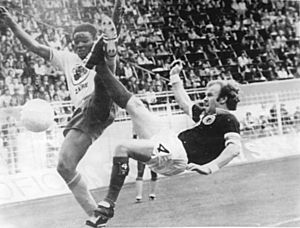
Before the 1978 FIFA World Cup, MacLeod made the nation hopeful by saying Scotland would come home with a medal. Thousands of fans cheered the team off at Hampden Park and lined the route to the airport. However, Scotland lost their first game 3–1 to Peru and drew 1–1 with newcomers Iran. These results meant Scotland had to beat the Netherlands by three goals to move on. Even though the Dutch scored first, Scotland fought back to win 3–2. Kenny Dalglish scored one goal, and Archie Gemmill scored two. Gemmill's second goal is considered one of the greatest World Cup goals ever. He dribbled past three Dutch defenders and chipped the ball over the goalkeeper. But the win wasn't enough, and Scotland was eliminated on goal difference for the second World Cup in a row.
The 1980s: Stein and Ferguson
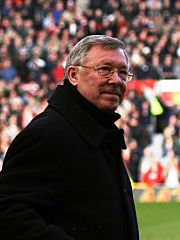
MacLeod resigned after the 1978 World Cup, and Jock Stein became the new manager. Stein had famously won nine league titles and the European Cup with Celtic. After missing out on the 1980 European Championship, Scotland qualified for the 1982 FIFA World Cup from a tough group. They lost only one match. At the World Cup, they beat New Zealand 5–2 but lost 4–1 to a strong Brazil team. Scotland was again knocked out on goal difference after a 2–2 draw with the Soviet Union.
Scotland qualified for the 1986 FIFA World Cup, their fourth in a row, in a very dramatic way. In their last qualifying match against Wales, they needed a draw to get into a playoff against Australia. With only nine minutes left and Wales leading 1–0, Scotland got a penalty kick. Davie Cooper calmly scored, making it 1–1. This draw meant Scotland went through, but as players and fans celebrated, manager Jock Stein had a heart attack and sadly passed away. His assistant, Alex Ferguson, took over. Scotland qualified by winning 2–0 against Australia over two games. However, they were eliminated from the World Cup with just one point from their three matches.
In July 1986, Andy Roxburgh became the new manager. Scotland didn't qualify for Euro 1988, but their 1–0 away win over Bulgaria in November 1987 helped Ireland surprisingly win their group and qualify.
Four Major Tournaments in the 1990s
Scotland qualified for their fifth World Cup in a row, the 1990 World Cup, by finishing second in their group ahead of France. Scotland was in a group with Costa Rica, Sweden, and Brazil. They lost 1–0 to Costa Rica. They bounced back to beat Sweden 2–1 but then lost 1–0 to Brazil in their third match, getting knocked out in the first round again.
Scotland qualified for the UEFA European Championship for the first time in 1992. A 1–0 loss to Romania away from home meant qualification depended on other results. A 1–1 draw between Bulgaria and Romania in the last group match allowed Scotland to just make it through. Even though they played well against the Netherlands and Germany, and had a good win against the CIS, the team was knocked out in the group stage. Scotland did not qualify for the 1994 FIFA World Cup. They finished fourth in their qualifying group. When it was clear Scotland couldn't qualify, Andy Roxburgh resigned as manager.
New manager Craig Brown successfully led Scotland to the 1996 European Championship. Their first game against the Netherlands was a 0–0 draw, which boosted spirits before a big game against England at Wembley. Gary McAllister missed a penalty, and a goal by Paul Gascoigne led to a 2–0 defeat. Scotland then beat Switzerland 1–0 with a goal from Ally McCoist. England taking a 4–0 lead in their game briefly put Scotland in a qualifying spot, but a late goal for the Netherlands meant they went through instead of Scotland, based on goals scored.
Brown again guided Scotland to qualify for a major tournament in 1998. Scotland was drawn against Brazil in the opening game of the 1998 World Cup. John Collins scored a penalty to make it 1–1, but a Tom Boyd own goal led to a 2–1 defeat. Scotland drew their next game 1–1 with Norway, but the final match against Morocco ended in a disappointing 3–0 loss.
During qualification for the 2000 European Championship, Scotland played England in a two-game playoff. Scotland won the second match 1–0 with a goal by Don Hutchison, but lost the overall tie 2–1.
The 2000s: New Managers and Close Calls
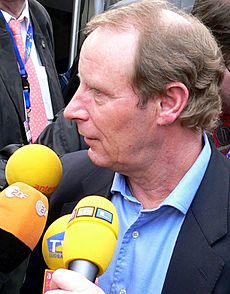
Scotland did not qualify for the 2002 FIFA World Cup, finishing third in their group. This second failure to qualify in a row led to Craig Brown resigning. The SFA then hired former Germany manager Berti Vogts. Scotland reached the playoffs for Euro 2004, where they beat the Netherlands 1–0 at Hampden Park. However, they lost the return game 6–0. Poor results in friendly matches and a bad start to the 2006 World Cup qualification caused the team to drop to a record low of 77th in the FIFA World Rankings. Vogts resigned in 2004, saying the media was too critical.
Walter Smith, a former manager of Rangers and Everton, took over from Vogts. Results improved, and Scotland rose in the FIFA rankings, even winning the Kirin Cup, a friendly competition in Japan. Scotland did not qualify for the 2006 FIFA World Cup, finishing third in their group. Smith left the national team in January 2007 to go back to Rangers, with Scotland leading their Euro 2008 qualification group. New manager Alex McLeish led Scotland to wins against Georgia, the Faroe Islands, Lithuania, France, and Ukraine. But losses to Georgia and Italy ended their chances of qualifying for Euro 2008. These better results, especially the wins against France, moved Scotland into the top 20 of the FIFA world rankings.
After narrowly missing Euro 2008, McLeish left to join Premier League club Birmingham City. Southampton manager George Burley was hired, but he faced criticism after the team lost their first qualifier to Macedonia. After Scotland lost 3–0 to the Netherlands, captain Barry Ferguson and goalkeeper Allan McGregor were left out of the next game due to a "breach of discipline." Despite winning 2–1 against Iceland, Scotland lost 4–0 to Norway in the next qualifier. This meant Scotland needed to win their last two games to have a chance at the playoffs. They beat Macedonia 2–0 but were eliminated by a 1–0 loss to the Netherlands. Burley stayed on after a review, but a later 3–0 friendly loss to Wales led to him being fired.
The 2010s: Qualification Struggles
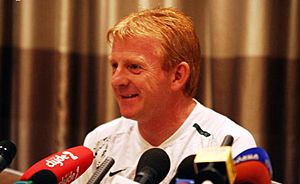
The SFA appointed Craig Levein as head coach in December 2009. In UEFA Euro 2012 qualifying, Scotland was in a group with Lithuania, Liechtenstein, the Czech Republic, and world champions Spain. They only got four points from their first four games, meaning they needed three wins from their last four to have a chance. They only managed two wins and a draw and were eliminated after a 3–1 loss to Spain in their last match. Levein left his job after a poor start to 2014 FIFA World Cup qualification, with only two points from four games.
Gordon Strachan became Scotland manager in January 2013. However, losses in his first two competitive matches meant Scotland was the first European team to be out of the 2014 World Cup. Scotland finished their qualifying group by winning three of their last four matches, including two victories against Croatia.
UEFA Euro 2016 expanded from 16 to 24 teams. After losing their first qualifier in Germany, Scotland won home games against Georgia, the Republic of Ireland, and Gibraltar. Steven Fletcher scored the first hat-trick for Scotland since 1969 in the game against Gibraltar. Later in the group, Scotland played poorly and lost 1–0 in Georgia. A home defeat by Germany and a late goal by Poland meant Scotland was out of the running. After a win against Gibraltar in the last qualifier, Strachan signed a new contract with the SFA.
In qualification for the 2018 FIFA World Cup, Scotland was in the same group as England, playing their rivals in a competitive game for the first time since 1999. On November 11, 2016, England beat Scotland 3–0 at Wembley. In the return match, Leigh Griffiths scored two late free-kicks to give Scotland a 2–1 lead, but Harry Kane scored in added time for a 2–2 draw. A draw in Slovenia in the final group game ended Scotland's hopes of a playoff spot, and Strachan left his job. In February 2018, Alex McLeish became manager for the second time. The team won their group in the 2018–19 UEFA Nations League, but McLeish left in April 2019 after a bad start to UEFA Euro 2020 qualifying, including a 3–0 loss to 117th-ranked Kazakhstan.
The 2020s: Euro Qualifications
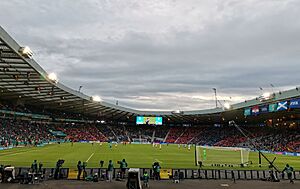
Steve Clarke became Scotland manager in May 2019. The team didn't qualify automatically for UEFA Euro 2020, but they won two penalty shootouts in the playoffs against Israel and Serbia. This put Scotland into their first major tournament since 1998. Losses to the Czech Republic and Croatia, along with a 0–0 draw with England, meant Scotland finished last in their group.
Six wins in a row later that year meant Scotland finished second in their World Cup qualifying group. This sent them to the playoffs, where they faced Ukraine at Hampden. Scotland lost 3–1. Later that year, Scotland won their Nations League group and were promoted to League A.
The Scots started their UEFA Euro 2024 qualifying campaign with five wins in a row, including a 2–0 victory over Spain at Hampden. Even though they lost their sixth match, the return game against Spain, they qualified for Euro 2024 with two games to spare after Norway lost 1–0 to Spain. This was the first time they qualified for a major tournament directly through a qualifying group since 1998. Scotland was drawn to play Germany, Switzerland, and Hungary in their group. They lost 5–1 to Germany in the opening match, drew 1–1 with Switzerland, and lost 1–0 to Hungary, finishing last in the group again. It's estimated that about 200,000 Scotland fans traveled to Euro 2024.
Scotland's Home Stadium
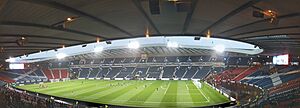
Hampden Park in Glasgow is the traditional home of the Scotland team and is called the National Stadium by the SFA. The current stadium is one of three stadiums that have used this name. Stadiums called Hampden Park have hosted international matches since 1878. The current stadium opened in 1903 and became the main home ground for the Scotland team from 1906. The record attendance of 149,415 was set during the Scotland vs. England match in 1937. Safety rules reduced the capacity to 81,000 by 1977. The stadium was completely rebuilt in the 1990s, giving it its current capacity of 52,000. Hampden is a top-rated stadium by UEFA.
Some friendly matches are played at smaller stadiums. Pittodrie Stadium in Aberdeen and Easter Road in Edinburgh were both used in 2017. Other stadiums were also used when Hampden was being rebuilt in the 1990s. Celtic Park, Ibrox Stadium, Pittodrie Stadium, and Rugby Park all hosted matches during the 1998 World Cup qualifying games. Tynecastle Stadium, Pittodrie, Celtic Park, and Ibrox Stadium were used for Euro 2000 qualifying matches. Since Hampden was finished being rebuilt in 1999, Scotland has played most of their important matches there. The only recent exception was in 2014, when Hampden was temporarily changed into an athletics stadium for the 2014 Commonwealth Games. The SFA bought Hampden from Queen's Park in 2020, and all of Scotland's home games have been played there since then.
Team Colours
|
|
| Tartan-style kit with blue shorts worn at UEFA Euro 1996. |
Scotland usually wears dark blue shirts with white shorts and dark blue socks. These are the colors of the Queen's Park team, whose players represented Scotland in the first international match. The blue Scotland shirt was also used in a rugby game in February 1872. Reports said "the scotch were easily distinguishable by their uniform of blue jerseys.... the jerseys having the thistle embroidered." The thistle is Scotland's national flower. The shirt has a crest based on the lion rampant from the Royal Standard of Scotland.
Another common style for Scotland is blue shirts, white shorts, and red socks. Sometimes, navy shorts and socks are used as alternative colors when Scotland plays a team that has similar colors for those items, but the home shirt is still suitable.
Away kits change, but they are most often white or yellow shirts with blue shorts. In 2016–17, Scotland wore pink shirts with black shorts and socks as their away kit. This kit was even used in one home match against Slovakia because both of Slovakia's kits clashed with Scotland's home kit. Third kits have been used twice. Amber shirts, navy shorts, and navy socks were used in 2005–06. An all 'cherry red' kit was used once against Georgia in the Euro 2008 qualifiers in 2007.
From 1994 to 1996, a tartan kit was used. This kit was worn in all three of Scotland's matches at UEFA Euro 1996.
Scotland hasn't always played in dark blue. Sometimes, between 1881 and 1951, they wore the primrose and pink racing colors of Archibald Primrose, 5th Earl of Rosebery. Lord Rosebery, a former Prime Minister, was important in Scottish football. His colors were used most often in the early 1900s. When Scotland beat England 4–1 in 1900, Lord Rosebery said, "I have never seen my colours so well sported since Ladas won the Derby." Rosebery's colors were brought back as an away kit for the UEFA Euro 2016 qualifying matches.
The current team crest is a round shape, similar to the one used from 1961 to 1988. It has a shield inside with "Scotland" written at the top and "Est 1873" at the bottom. The shield background has 11 thistles, which are Scotland's national flower, along with the lion rampant. Since 2005, the SFA has supported using Scottish Gaelic on the national team's uniform to recognize the language's importance in Scotland.
| Kit supplier | Period |
|---|---|
| None | 1872–1953 |
| 1953–2000 | |
| 2000–2003 | |
| 2003–2010 | |
| 2010– |
Scotland's Supporters: The Tartan Army
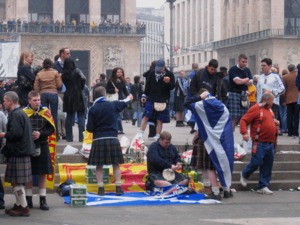
Scotland's fans are known as the Tartan Army. In the 1970s, some Scotland fans were known for hooliganism in England, especially after they invaded the Wembley pitch and broke the goalposts after the England vs. Scotland match in 1977. Since then, the Tartan Army has earned awards from UEFA for their loud support, friendly nature, and charity work. They have received a Fair Play prize and were named the best supporters during the 1992 European Championship. Fans were also given a trophy for non-violence in sports and were voted by journalists as the best supporters for their fair play and sportsmanship at the 1998 World Cup in France.
Coaching the Team
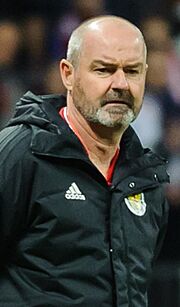
The role of team manager started in May 1954, when Andy Beattie managed six matches, including during the 1954 FIFA World Cup. Before that, a committee from the SFA chose the team. After the tournament, the committee took over again until Matt Busby was appointed in 1958. Busby couldn't start right away because of serious injuries from the Munich air disaster.
Twenty-four different people have been manager since then. Beattie, Jock Stein, and Alex McLeish each had two turns as manager. Six of these managers were temporary. Craig Brown held the job the longest, for 9 years, including two major tournaments and 71 matches. Many managers have led the team in major competitions, including Beattie (1954), Dawson Walker (1958), Willie Ormond (1974), Ally MacLeod (1978), Jock Stein (1982), Alex Ferguson (1986), Andy Roxburgh (1990 and 1992), Brown (1996 and 1998), and Steve Clarke (2020 and 2024). Ian McColl, Ormond, and MacLeod all won the British Home Championship outright.
German coach Berti Vogts became the first foreign manager in 2002. His time was generally seen as unsuccessful, and Scotland's FIFA World Ranking dropped to its lowest ever, 88th, in March 2005. Walter Smith and Alex McLeish achieved better results, with the ranking improving to a high of 13th in October 2007. But both only stayed for a short time before returning to club management. George Burley and Craig Levein had worse results and were eventually fired. Results got a bit better under Gordon Strachan, but he couldn't get the team to a major tournament. After McLeish's second time as manager, Steve Clarke was appointed in May 2019. Clarke led the team to qualify for Euro 2020, their first major competition since 1998, and then for Euro 2024.
Current Coaching Staff
| Position | Name |
|---|---|
| Head Coach | Steve Clarke |
| Assistant Coach | John Carver |
| Coach | James Morrison |
| Goalkeeping Coach | Chris Woods |
Players of the Scotland Team
Current Squad Members
The players listed below were called up for friendly matches against Iceland and Liechtenstein in June 2025.
Caps (games played) and goals are updated as of June 9, 2025, after the match against Liechtenstein. Clubs are correct as of July 16, 2025.
| No. | Pos. | Player | Date of birth (age) | Caps | Goals | Club |
|---|---|---|---|---|---|---|
| 1 | GK | Ross Doohan | 29 March 1998 | 1 | 0 | |
| 12 | GK | Callan McKenna | 22 December 2006 | 0 | 0 | |
| 21 | GK | Cieran Slicker | 15 September 2002 | 1 | 0 | |
|
|
||||||
| 2 | DF | Anthony Ralston | 16 November 1998 | 21 | 1 | |
| 3 | DF | Andy Robertson (captain) | 11 March 1994 | 84 | 4 | |
| 5 | DF | Grant Hanley | 20 November 1991 | 62 | 2 | Unattached |
| 13 | DF | Jack Hendry | 7 May 1995 | 35 | 3 | |
| 15 | DF | John Souttar | 25 September 1996 | 16 | 2 | |
| 16 | DF | Scott McKenna | 12 November 1996 | 42 | 1 | |
| 22 | DF | Max Johnston | 26 December 2003 | 2 | 0 | |
| 23 | DF | Josh Doig | 18 May 2002 | 1 | 0 | |
| 24 | DF | Nathan Patterson | 16 October 2001 | 23 | 1 | |
|
|
||||||
| 7 | MF | John McGinn | 18 October 1994 | 77 | 20 | |
| 8 | MF | Billy Gilmour | 11 June 2001 | 40 | 2 | |
| 14 | MF | Lennon Miller | 25 August 2006 | 2 | 0 | |
| 17 | MF | Andy Irving | 13 May 2000 | 1 | 0 | |
| 19 | MF | Lewis Ferguson | 24 August 1999 | 16 | 0 | |
| 20 | MF | Connor Barron | 29 August 2002 | 1 | 0 | |
|
|
||||||
| 9 | FW | George Hirst | 15 February 1999 | 4 | 1 | |
| 10 | FW | Ché Adams | 13 July 1996 | 39 | 9 | |
| 11 | FW | Tommy Conway | 6 August 2002 | 6 | 0 | |
| 18 | FW | James Wilson | 6 March 2007 | 1 | 0 | |
| 25 | FW | Kieron Bowie | 21 September 2002 | 1 | 0 | |
Recent Call-ups
The following players have also been selected by Scotland in the past twelve months.
| Pos. | Player | Date of birth (age) | Caps | Goals | Club | Latest call-up |
|---|---|---|---|---|---|---|
| GK | Angus GunnINJ | 22 January 1996 | 16 | 0 | Unattached | v. |
| GK | Robby McCrorieINJ | 18 March 1998 | 0 | 0 | v. |
|
| GK | Craig Gordon | 31 December 1982 | 81 | 0 | v. |
|
| GK | Liam Kelly | 23 January 1996 | 1 | 0 | v. |
|
| GK | Jon McCracken | 24 May 2000 | 0 | 0 | v. |
|
| GK | Zander Clark | 26 June 1992 | 4 | 0 | v. |
|
|
|
||||||
| DF | Kieran TierneyINJ | 5 June 1997 | 50 | 1 | v. |
|
| DF | Ryan Porteous | 25 March 1999 | 13 | 1 | v. |
|
| DF | Greg Taylor | 5 November 1997 | 14 | 0 | v. |
|
| DF | Nicky Devlin | 17 October 1993 | 2 | 0 | v. |
|
| DF | Liam Lindsay | 12 October 1995 | 0 | 0 | v. |
|
| DF | Jack MacKenzie | 7 April 2000 | 0 | 0 | v. |
|
|
|
||||||
| MF | Scott McTominayINJ | 8 December 1996 | 61 | 12 | v. |
|
| MF | Ryan Christie | 22 February 1995 | 59 | 7 | v. |
|
| MF | Kenny McLean | 8 January 1992 | 50 | 2 | v. |
|
| MF | Stuart Armstrong | 30 March 1992 | 53 | 5 | Unattached | v. |
| MF | Ben Doak | 11 November 2005 | 6 | 0 | v. |
|
| MF | Ryan Gauld | 16 December 1995 | 6 | 0 | v. |
|
| MF | Lewis MorganINJ | 30 September 1996 | 7 | 0 | v. |
|
| MF | James ForrestINJ | 7 July 1991 | 39 | 5 | v. |
|
|
|
||||||
| FW | Kevin Nisbet | 8 March 1997 | 11 | 1 | v. |
|
| FW | Lyndon Dykes | 7 October 1995 | 42 | 9 | v. |
|
| FW | Lawrence Shankland | 10 August 1995 | 16 | 3 | v. |
|
|
||||||
Honored Players
The Scottish Football Association has a special list called the Scotland national football team roll of honour for players who have played more than 50 games for Scotland. As of June 2024, there are 39 players on this list. Scott McTominay and Ryan Christie are the newest additions. Because the list requires 50 games, many famous Scotland players, including Jim Baxter, Davie Cooper, and Hughie Gallacher, are not on it.
The Scottish Football Museum has a Scottish Football Hall of Fame for players and managers involved in Scottish football. This means people who didn't play for Scotland, like Brian Laudrup and Henrik Larsson, can also be included. Sportscotland also has a Scottish Sports Hall of Fame, which has included some footballers.
Team Records
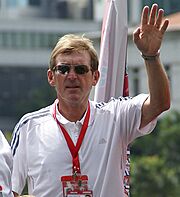
Kenny Dalglish holds the record for most appearances for Scotland, playing 102 times between 1971 and 1986. He is the only Scotland player to reach 100 caps. Jim Leighton is second with 91 games, which is a Scottish record for a goalkeeper. The title of Scotland's highest goalscorer is shared by two players. Denis Law scored 30 goals in 55 games between 1958 and 1974. Kenny Dalglish scored the same number of goals in 102 appearances. Hughie Gallacher is the third-highest scorer and also the most efficient, with 24 goals from only 20 games (averaging 1.2 goals per game).
Scotland's biggest win was 11–0 against Ireland in 1901. Their biggest loss happened during the 1954 FIFA World Cup, a 7–0 defeat against the reigning world champions Uruguay.
Scotland's match against England in the 1937 British Home Championship set a new world record for football attendance. The official crowd at Hampden Park was 149,415, though even more fans might have gotten in without tickets. This record was broken 13 years later by a match in the 1950 FIFA World Cup, but it remains a European record.
Scotland in Major Tournaments
FIFA World Cup History
Scotland did not play in the first three World Cups (1930, 1934, and 1938). This was because FIFA wanted all its member associations to pay for players' expenses, which Scotland and other British associations disagreed with. They left FIFA but rejoined in 1946. The SFA chose not to play in the 1950 FIFA World Cup even though they had qualified, because they hadn't won the British Home Championship.
Scotland has since qualified for eight World Cup finals. They qualified for five tournaments in a row from 1974 to 1990. Scotland has never made it past the first round of the World Cup finals. No other country has qualified for so many World Cups without getting past the first round. They were eliminated on goal difference three times: in 1974 (by Brazil), in 1978 (by the Netherlands), and in 1982 (by the Soviet Union).
| Year | FIFA World Cup record | Qualification record | |||||||||||||
|---|---|---|---|---|---|---|---|---|---|---|---|---|---|---|---|
| Round | Pld | W | D | L | GF | GA | Pld | W | D | L | GF | GA | Position | ||
| 1930 | Not a FIFA member | Not a FIFA member | |||||||||||||
| 1934 | |||||||||||||||
| 1938 | |||||||||||||||
| 1950 | Qualified but withdrew | 3 | 2 | 0 | 1 | 10 | 3 | 2nd / 4 | |||||||
| 1954 | Group stage | 2 | 0 | 0 | 2 | 0 | 8 | 3 | 1 | 1 | 1 | 8 | 8 | 2nd / 4 | |
| 1958 | 3 | 0 | 1 | 2 | 4 | 6 | 4 | 3 | 0 | 1 | 10 | 9 | 1st / 3 | ||
| 1962 | Did not qualify | 5 | 3 | 0 | 2 | 12 | 11 | 2nd / 3 | |||||||
| 1966 | 6 | 3 | 1 | 2 | 8 | 8 | 2nd / 4 | ||||||||
| 1970 | 6 | 3 | 1 | 2 | 18 | 7 | 2nd / 4 | ||||||||
| 1974 | Group stage | 3 | 1 | 2 | 0 | 3 | 1 | 4 | 3 | 0 | 1 | 8 | 3 | 1st / 3 | |
| 1978 | 3 | 1 | 1 | 1 | 5 | 6 | 4 | 3 | 0 | 1 | 6 | 3 | 1st / 3 | ||
| 1982 | 3 | 1 | 1 | 1 | 8 | 8 | 8 | 4 | 3 | 1 | 9 | 4 | 1st / 5 | ||
| 1986 | 3 | 0 | 1 | 2 | 1 | 3 | 8 | 4 | 2 | 2 | 10 | 4 | 2nd / 4 | ||
| 1990 | 3 | 1 | 0 | 2 | 2 | 3 | 8 | 4 | 2 | 2 | 12 | 12 | 2nd / 5 | ||
| 1994 | Did not qualify | 10 | 4 | 3 | 3 | 14 | 13 | 4th / 6 | |||||||
| 1998 | Group stage | 3 | 0 | 1 | 2 | 2 | 6 | 10 | 7 | 2 | 1 | 15 | 3 | 2nd / 6 | |
| 2002 | Did not qualify | 8 | 4 | 3 | 1 | 12 | 6 | 3rd / 5 | |||||||
| 2006 | 10 | 3 | 4 | 3 | 9 | 7 | 3rd / 6 | ||||||||
| 2010 | 8 | 3 | 1 | 4 | 6 | 11 | 3rd / 5 | ||||||||
| 2014 | 10 | 3 | 2 | 5 | 8 | 12 | 4th / 6 | ||||||||
| 2018 | 10 | 5 | 3 | 2 | 17 | 12 | 3rd / 6 | ||||||||
| 2022 | 11 | 7 | 2 | 2 | 18 | 10 | 2nd / 6 | ||||||||
| 2026 | To be determined | To be determined | |||||||||||||
| 2030 | |||||||||||||||
| 2034 | |||||||||||||||
| Totals | 8/22 | 23 | 4 | 7 | 12 | 25 | 41 | 136 | 69 | 30 | 37 | 210 | 146 |
—
|
|
Draws include knockout matches decided via penalty shoot-out; correct as of June 1, 2022, after the match against Ukraine.
UEFA European Championship History
Scotland has qualified for four European Championships. However, they have not been able to get past the first round. Their most recent appearance was at Euro 2024.
| Year | UEFA European Championship record | Qualification record | ||||||||||||||
|---|---|---|---|---|---|---|---|---|---|---|---|---|---|---|---|---|
| Round | Position | Pld | W | D | L | GF | GA | Pld | W | D | L | GF | GA | Position | ||
| 1960 | Did not enter | Did not enter | ||||||||||||||
| 1964 | ||||||||||||||||
| 1968 | Did not qualify | 6 | 3 | 2 | 1 | 10 | 8 | 2nd / 4 | ||||||||
| 1972 | 6 | 3 | 0 | 3 | 4 | 7 | 3rd / 4 | |||||||||
| 1976 | 6 | 2 | 3 | 1 | 8 | 6 | 3rd / 4 | |||||||||
| 1980 | 8 | 3 | 1 | 4 | 15 | 13 | 4th / 5 | |||||||||
| 1984 | 6 | 1 | 2 | 3 | 8 | 10 | 4th / 4 | |||||||||
| 1988 | 8 | 3 | 3 | 2 | 7 | 5 | 4th / 5 | |||||||||
| 1992 | Group stage | 5th | 3 | 1 | 0 | 2 | 3 | 3 | 8 | 4 | 3 | 1 | 14 | 7 | 1st / 5 | |
| 1996 | 12th | 3 | 1 | 1 | 1 | 1 | 2 | 10 | 7 | 2 | 1 | 19 | 3 | 2nd / 6 | ||
| 2000 | Did not qualify | 12 | 6 | 3 | 3 | 16 | 12 | 2nd / 6 | ||||||||
| 2004 | 10 | 5 | 2 | 3 | 13 | 14 | 2nd / 5 | |||||||||
| 2008 | 12 | 8 | 0 | 4 | 21 | 12 | 3rd / 7 | |||||||||
| 2012 | 8 | 3 | 2 | 3 | 9 | 10 | 3rd / 5 | |||||||||
| 2016 | 10 | 4 | 3 | 3 | 22 | 12 | 4th / 6 | |||||||||
| 2020 | Group stage | 22nd | 3 | 0 | 1 | 2 | 1 | 5 | 12 | 5 | 2 | 5 | 17 | 20 | 3rd / 6 | |
| 2024 | 24th | 3 | 0 | 1 | 2 | 2 | 7 | 8 | 5 | 2 | 1 | 17 | 8 | 2nd / 5 | ||
| 2028 | To be determined | To be determined | ||||||||||||||
| 2032 | To be determined | To be determined | ||||||||||||||
| Totals | Group stage | 4/17 | 12 | 2 | 3 | 7 | 7 | 17 | 130 | 62 | 30 | 38 | 200 | 147 |
—
|
|
Draws include knockout matches decided via penalty shoot-out; correct as of June 23, 2024, after the match against Hungary.
UEFA Nations League Performance
When the UEFA Nations League started in 2018–19, Scotland was placed in League C. With a 3–2 win against Israel in their last match, Scotland earned promotion to League B for the 2020–21 competition.
Scotland won promotion to League A in their final match of the 2022–23 competition, a 0–0 draw against Ukraine. They were immediately moved back down to League B in the 2024–25 competition, after losing a playoff against Greece.
| UEFA Nations League record | |||||||||||||||||||||
|---|---|---|---|---|---|---|---|---|---|---|---|---|---|---|---|---|---|---|---|---|---|
| League phase | Finals | ||||||||||||||||||||
| Season | LG | Grp | Pos | Pld | W | D | L | GF | GA | P/R | IR | Year | Pld | W | D* | L | GF | GA | Squad | OR | |
| 2018–19 | C | 1 | 1st | 4 | 3 | 0 | 1 | 10 | 4 | 25th | 2019 | Did not qualify | 25th | ||||||||
| 2020–21 | B | 2 | 2nd | 6 | 3 | 1 | 2 | 5 | 4 | 23rd | 2021 | 23th | |||||||||
| 2022–23 | B | 1 | 1st | 6 | 4 | 1 | 1 | 11 | 5 | 20th | 2023 | 20th | |||||||||
| 2024–25 | A | 1 | 3rd | 8 | 3 | 1 | 4 | 8 | 11 | 9th | 2025 | 9th | |||||||||
| 2026–27 | B | 2027 | TBD | ||||||||||||||||||
| Total | 24 | 13 | 3 | 8 | 34 | 24 | 9th | Total | 0 | 0 | 0 | 0 | 0 | 0 | 9th | ||||||
Draws include knockout matches decided via penalty shoot-out; correct as of March 23, 2025, after the match against Greece.
Team Honours
Regional Championships
- British Home Championship
- Champions (41)
- Outright winners (24): 1884, 1885, 1887, 1889, 1894, 1896, 1897, 1900, 1902, 1910, 1921, 1922, 1923, 1929, 1935, 1936, 1946, 1949, 1951, 1962, 1963, 1967, 1976, 1977
- Shared (17): 1886, 1890, 1903, 1906, 1908, 1912, 1927, 1931, 1935, 1939, 1953, 1956, 1960, 1964, 1970, 1972, 1974
- Champions (41)
Friendly Competitions
- Rous Cup
- Champions (1): 1985
- Kirin Cup
- Champions (1): 2006
- Qatar Airways Cup
- Champions (1): 2015
United Kingdom Team
Scotland has always played by itself in most major football tournaments, like the FIFA World Cup and the UEFA European Championship. However, at the Olympic Games, the International Olympic Committee only allows a Great Britain Olympic football team to compete, representing the whole United Kingdom. Teams of amateur players represented Great Britain at the Olympics from 1900 until 1972. After that, the FA stopped entering a team because the difference between amateur and professional players was removed. When London successfully bid for the 2012 Summer Olympics, the FA looked into how a team could be entered. The SFA said they would not take part, fearing it would threaten Scotland's independent national team status. FIFA President Sepp Blatter said this wouldn't happen, but the SFA worried a future President might think differently. An agreement was made in May 2009 that the FA could organize a team using only England-qualified players. However, this was challenged by the British Olympic Association. In the end, only English and Welsh players were chosen for the men's team, but two Scottish players were selected for the women's team.
See also
 In Spanish: Selección de fútbol de Escocia para niños
In Spanish: Selección de fútbol de Escocia para niños
 | Kyle Baker |
 | Joseph Yoakum |
 | Laura Wheeler Waring |
 | Henry Ossawa Tanner |


